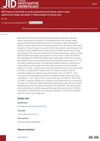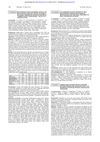 September 2022 in “Plastic and Reconstructive Surgery”
September 2022 in “Plastic and Reconstructive Surgery” Baricitinib helps with severe hair loss, negative-pressure therapy lowers hernia recurrence, tranexamic acid reduces bleeding, robot-assisted breast surgery may improve outcomes, and acellular dermal matrix could decrease breast reconstruction complications.
[object Object] 25 citations,
March 2017 in “International Journal of Dermatology” Ruxolitinib effectively and safely regrows hair in alopecia patients.
 7 citations,
August 2023 in “Journal of the American Academy of Dermatology”
7 citations,
August 2023 in “Journal of the American Academy of Dermatology” JAK inhibitors offer new hope for treating severe alopecia areata.
 February 2024 in “Journal of the European Academy of Dermatology and Venereology”
February 2024 in “Journal of the European Academy of Dermatology and Venereology” Baricitinib is effective and safe for long-term use in severe alopecia areata, improving hair regrowth and quality of life with few side effects.
 December 2023 in “Journal of Ayub Medical College Abbottabad”
December 2023 in “Journal of Ayub Medical College Abbottabad” Ritlecitinib effectively treats alopecia areata in patients 12 and older with fewer side effects.
 April 2023 in “Journal of Investigative Dermatology”
April 2023 in “Journal of Investigative Dermatology” Baricitinib at 2mg and 4mg doses improved work productivity and reduced costs for adults with atopic dermatitis.
 June 2023 in “British Journal of Dermatology”
June 2023 in “British Journal of Dermatology” Baricitinib was effective in treating severe and very severe alopecia areata after 52 weeks.
 June 2013 in “Annals of the rheumatic diseases”
June 2013 in “Annals of the rheumatic diseases” Methotrexate dose has little effect on its toxicity when used with adalimumab for early rheumatoid arthritis.
 September 2024 in “Journal of the American Academy of Dermatology”
September 2024 in “Journal of the American Academy of Dermatology” Oxytocin receptors are found in skin cells near touch and pain neurons.
 January 2024 in “Journal of Crohn's and colitis”
January 2024 in “Journal of Crohn's and colitis” Janus Kinase inhibitors are effective and have an acceptable safety profile for treating moderate to severe Ulcerative Colitis.
 February 2016 in “The journal of investigative dermatology/Journal of investigative dermatology”
February 2016 in “The journal of investigative dermatology/Journal of investigative dermatology” JAK inhibitors may help treat alopecia areata by reversing hair loss.
 238 citations,
November 2016 in “Journal of The American Academy of Dermatology”
238 citations,
November 2016 in “Journal of The American Academy of Dermatology” Tofacitinib is effective and safe for severe hair loss, but full regrowth is less likely after 10 years of hair loss.
 139 citations,
November 2016 in “Journal of the American Academy of Dermatology”
139 citations,
November 2016 in “Journal of the American Academy of Dermatology” Tofacitinib helped regrow hair in most adolescents with alopecia areata, but more research is needed.
 41 citations,
December 2015 in “JAMA Dermatology”
41 citations,
December 2015 in “JAMA Dermatology” Tofacitinib citrate improved nail dystrophy and pain in patients with alopecia universalis without causing side effects.
 16 citations,
January 2017 in “Acta dermatovenerologica Alpina, Pannonica et Adriatica (Tiskana izd.)”
16 citations,
January 2017 in “Acta dermatovenerologica Alpina, Pannonica et Adriatica (Tiskana izd.)” A patient with complete hair loss regrew all her hair using tofacitinib.
 9 citations,
August 2018 in “JAAD Case Reports”
9 citations,
August 2018 in “JAAD Case Reports” Tofacitinib can temporarily improve hair growth in alopecia universalis, but its effectiveness may decrease over time.
 2 citations,
October 2018 in “Archives of Dermatological Research”
2 citations,
October 2018 in “Archives of Dermatological Research” Tofacitinib helps mice grow more hair by increasing noggin and BMP4 levels, possibly better than minoxidil.
 1 citations,
August 2016 in “Journal of Investigative Dermatology”
1 citations,
August 2016 in “Journal of Investigative Dermatology” Activating STAT5 in the skin's dermal papilla is key for starting hair growth, regenerating hair follicles, and healing wounds.
 August 2019 in “Journal of The American Academy of Dermatology”
August 2019 in “Journal of The American Academy of Dermatology” RV3466F lotion significantly reduces hair loss and improves acute telogen effluvium.
 August 2016 in “Journal of Investigative Dermatology”
August 2016 in “Journal of Investigative Dermatology” The enzyme CD73 helps control human hair growth and could be targeted to treat hair growth disorders.
 August 2016 in “Journal of Investigative Dermatology”
August 2016 in “Journal of Investigative Dermatology” Blocking the CCR5 receptor may be a new way to treat hair loss from alopecia areata.
 August 2016 in “Journal of Investigative Dermatology”
August 2016 in “Journal of Investigative Dermatology” Human hair follicles have a scent receptor that can influence hair growth.
 32 citations,
April 2019 in “JAAD case reports”
32 citations,
April 2019 in “JAAD case reports” JAK inhibitors helped treat hair loss in two people with Down syndrome.
[object Object]  24 citations,
June 2016 in “Acta dermato-venereologica”
24 citations,
June 2016 in “Acta dermato-venereologica” Tofacitinib helped a young woman's severe hair loss and arthritis but not her plaque psoriasis.
 August 2022 in “Nature Biotechnology”
August 2022 in “Nature Biotechnology” Drug approvals slowed in 2Q22, but notable drugs like Amvuttra, Camzyos, and Olumiant were approved.
 1 citations,
September 2020 in “Cochrane library (CD-ROM)”
1 citations,
September 2020 in “Cochrane library (CD-ROM)” The analysis aims to identify the most effective and safest treatments for alopecia areata.
 August 2023 in “Journal of inflammation research”
August 2023 in “Journal of inflammation research” An elderly Chinese man lost all his hair after taking a new heart medication.
 July 2023 in “Dermatology and therapy”
July 2023 in “Dermatology and therapy” People with alopecia areata may have a higher risk of blood clots.
 June 2023 in “Dermatology and therapy”
June 2023 in “Dermatology and therapy” Doctors in the Middle East need better treatments and more knowledge about new therapies for hair loss condition Alopecia Areata.
20 citations,
December 2021 in “Journal of the American Academy of Dermatology” Continuous treatment with ritlecitinib and brepocitinib is needed to maintain hair regrowth in alopecia areata.



























